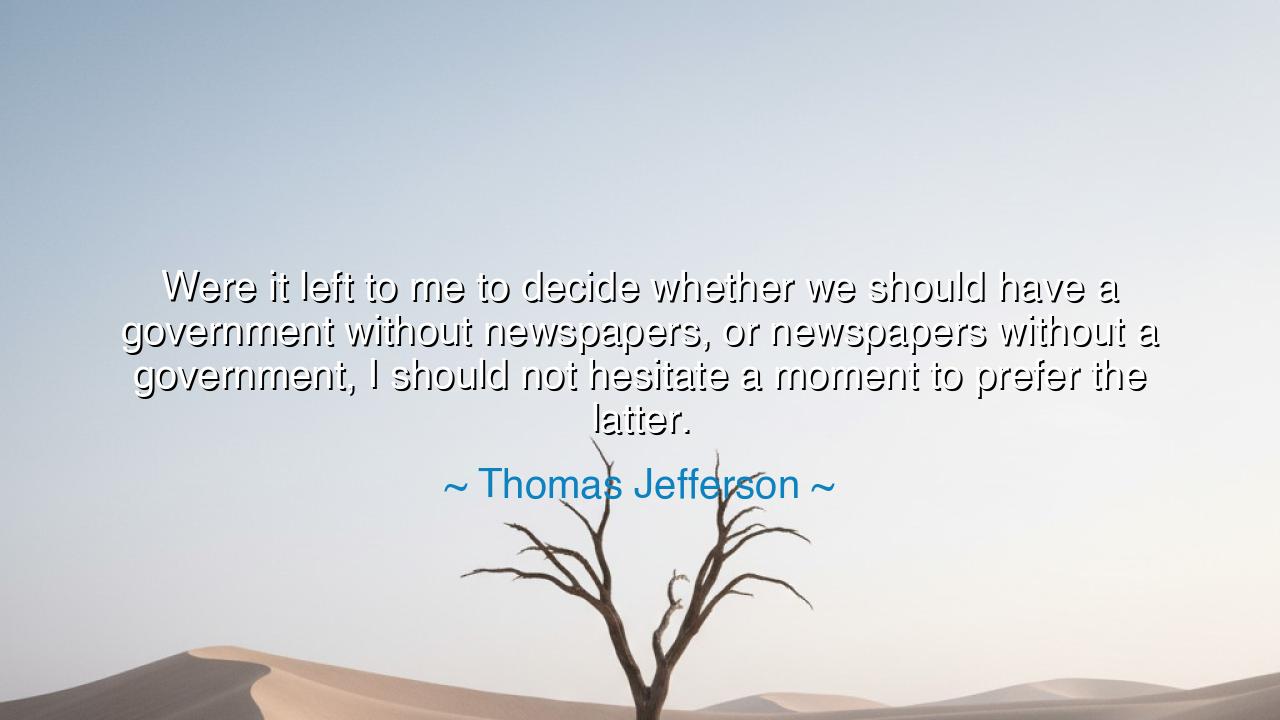
Were it left to me to decide whether we should have a government
Were it left to me to decide whether we should have a government without newspapers, or newspapers without a government, I should not hesitate a moment to prefer the latter.






The words of Thomas Jefferson blaze like a torch through the corridors of time: “Were it left to me to decide whether we should have a government without newspapers, or newspapers without a government, I should not hesitate a moment to prefer the latter.” In this single utterance lies the fierce and eternal spirit of freedom, the belief that truth—spoken, written, and shared—is the lifeblood of any people who would call themselves free. Jefferson, architect of liberty and author of America’s Declaration of Independence, knew that power without scrutiny decays, and that the silence of the press is the first symptom of tyranny. To him, information was not a luxury but a necessity—more vital than laws, more sacred than offices, and more enduring than rulers themselves.
This quote was born in the young dawn of the American Republic, in the age when the nation’s soul was still tender and untested. Jefferson wrote these words in 1787, in a letter to Colonel Edward Carrington, as he watched from afar the birth pangs of a government still learning to walk. The press, rough and partisan though it was, served as the people’s voice, the echo of their joys, fears, and grievances. Jefferson, who had seen the fires of monarchy and censorship in Europe, knew too well that the power of truth in the hands of the people was the only force strong enough to keep government in check. He was willing, if forced to choose, to sacrifice authority itself before surrendering the light of a free press. For without that light, the people become blind—and blind people, however well governed, are never truly free.
In the style of the ancients, we may liken Jefferson’s wisdom to that of Prometheus, who stole fire from the gods to give light to mankind. For knowledge is that same fire—divine, dangerous, and liberating. Tyrants fear it, for it exposes their lies; demagogues despise it, for it weakens their illusions. But to the free soul, knowledge is salvation. The newspapers of Jefferson’s age were the flame by which citizens could see the actions of their leaders, judge their character, and speak their minds. A government may pass laws, but without a free press to question them, corruption breeds unseen, like mold in darkness.
History offers many grim reminders of this truth. When the Third Reich rose in Germany, the first institution it silenced was the press. Journalists were imprisoned, editors were replaced with propagandists, and the printing press—once a tool of enlightenment—was turned into a weapon of deceit. The people, deprived of truth, became clay in the hands of tyranny. Compare this with the America of Jefferson’s vision, where even harsh criticism of government was a badge of honor, a sign of a living democracy. He understood that liberty is not comfort, but conflict, and that the arguments of a free people, however noisy, are the music of self-rule.
Yet Jefferson’s love for the press was not blind. He knew, as we know now, that newspapers could lie, mislead, and corrupt when greed replaced conscience. But he still preferred freedom with flaws to control with silence. For he believed that the remedy for falsehood was not censorship, but more truth. “Let the people be informed,” he said elsewhere, “and their own good sense will save them.” This is the faith of the enlightened: that light, once given, will find its way through shadow, and that the mind of man, though sometimes misled, will in time return to truth if left free to think.
So, my children of the future, remember this lesson carved in the stones of liberty: a government may survive without a crown, but not without a conscience. And the conscience of a free nation lives in its journalists, its writers, its truth-seekers. Guard them well, for when the voice of the people is silenced, the walls of freedom crumble quietly in the dark. The ruler who fears criticism already fears justice; the citizen who despises inquiry has forgotten his own power. The press may err, but its silence is a greater sin than all its errors combined.
Therefore, let every man and woman who loves liberty cherish the freedom of the press as they would cherish air or fire. Read not to believe blindly, but to understand deeply. Speak not to wound, but to awaken. Support those who pursue truth, even when it burns, for truth that burns also purifies. A nation of thinkers needs no chains; a nation of the silenced already wears them.
And so Jefferson’s words remain, as fresh as when first penned: that the newspaper, bearer of truth, is the very guardian of freedom’s flame. For governments rise and fall, but truth endures. And as long as there are voices brave enough to write, to question, and to illuminate, the people shall rule—not by force, but by knowledge. For it is better, as Jefferson said, to live with the noise of a free press than the quiet of an obedient world.






AAdministratorAdministrator
Welcome, honored guests. Please leave a comment, we will respond soon